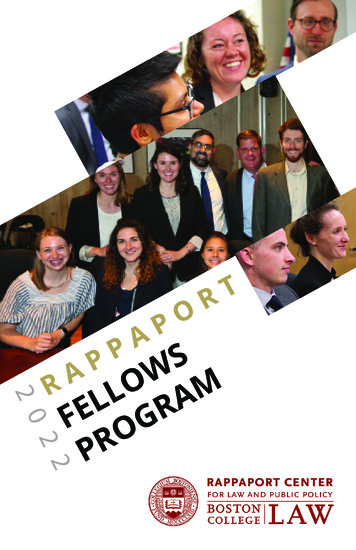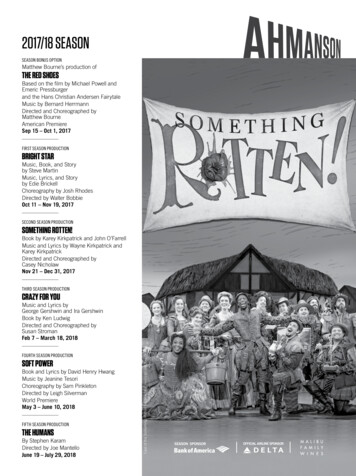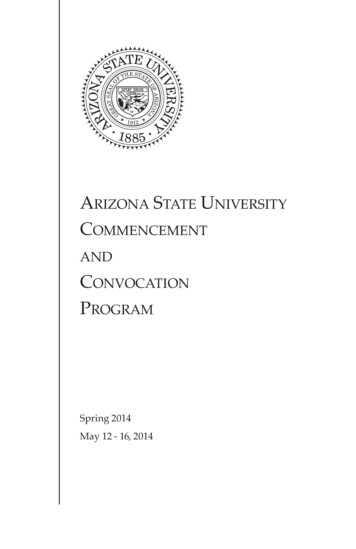
Transcription
OPAPSPWAORTR2 22 0MLALFE OGRPR
OverviewJerome Lyle and Phyllis RappaportThe Rappaport Center forLaw and Public Policy bringstogether state, local, andnational thought leaders andpolicy makers to addresssignificant issues of law andpublic policy. By conveninggovernment officials,legislators, practitioners,academics, students, andmembers of the public, we provide opportunities for respectfuldiscourse on pressing social issues. To inspire future public policyleaders, the Center also runs the Rappaport Fellows programwhich provides 12 law students from law schools throughoutMassachusetts with opportunities and funding to work on lawand policy issues in a state or local government agency during thesummer.Visit bc.edu/rappaport to learn more about what we do.2019 Rappaport Fellows with Jerry and Phyllis Rappaport, Rappaport Faculty Director DanielKanstroom, and Rappaport Executive Director, Elisabeth J. Medvedow.
Summer Fellowship ProgramRappaport Fellows are afforded experiences that connect thepractical and intellectual elements of public policy, public service, andcivic leadership. The program encompasses five major components:1. Interning for 10 weeks in a state or local government officeworking on law and public policy issues relevant to the GreaterBoston region and Massachusetts.2. Engaging in weekly forums that provide a look at the myriad wayslawyers in the public sector make a difference.3. Connecting with mentors from the Rappaport Center community–Rappaport Center Advisory Board members, prior Fellows,government officials, and civic leaders – who are paired withFellows based on interests and experiences.4. Completing the program final evaluation.5. Contributing a blog post during the summer.Fellows receive an 8,000 stipend (taxable) for participating in theProgram.Additional Funding Opportunity: the 2022 Rappaport Fellows willhave an opportunity to apply for grant funding to write a 20-25 pageresearch paper on an interesting or unresolved question of law andpublic policy related to Fellowship work. This will be a competitiveapplication process. Fellows whose papers are accepted andcompleted satisfactorily will receive a 2,000 grant, in addition to thestipend.“The best part of the Rappaport Fellowship was theopportunity to learn from so many dedicated and talentedpeople, from the lawyers I worked with at the AttorneyGeneral’s Office, to the two terrific mentors, the publicservants we met on our weekly outings, and a cohort ofFellows who share my passion for public policy.”Garrett Casey, Harvard Law School, 2018 Rappaport Fellow
InternshipsFields in which internships may be obtained include, but are notlimited to: Civil RightsCriminal JusticeEconomicsEducationEmployment and LaborEnergy EnvironmentHealth CareHousingMental HealthPay EquityTransportationExamples of Past Internships: Department of Elementary and Secondary EducationMassachusetts Department of TransportationCommittee for Public Counsel Services, Youth Advocacy DivisionGovernor’s Office of Legal CounselMassachusetts Attorney General’s OfficeMayor’s Office, City of BostonMassachusetts State Treasurer’s OfficeState Senator’s OfficeBoston Public SchoolsMassachusetts Executive Office of Public Safety and SecurityMassachusetts Department of Higher EducationMassachusetts Department of Veterans AffairsMentorsThe 2019 Rappaport Fellowsexplored the MBTA control room.Each Rappaport Fellow receives two mentors selected on the basis ofthe Fellow’s interests and experiences. The mentors, well respectedmembers of the legal community, are chosen from among ourAdvisory Board, prior Rappaport Fellows, and outside practitioners.
Experiential LearningOpportunitiesThe Rappaport Fellows meet weekly during June and July to experiencedifferent areas where law and public policy converge. Senior attorneys,judges, government officials, and community leaders often participatein the weekly programs to share their experiences, insights, and advice.The Rappaport Center Fellows become part of an interdisciplinarycommunity through a partnership with Harvard Kennedy School’sRappaport Institute for Greater Boston, which runs a similar Fellowsprogram for graduate non-law students interested in public policy.During the summer, the two groups of Fellows frequently meet togetherfor the weekly forums.Examples of Past Experiential LearningOpportunities:Meetings and/or tours with: Massachusetts Governor at the State House Mayor of Boston at City Hall Massachusetts Attorney General Chief Justice, Massachusetts Supreme Judicial Court General Manager, Massachusetts Bay Transportation Authority(MBTA)/ Control Room Haymarket Vent Building (Big Dig Tunnel) Massachusetts Correctional Institution“Before participating in this Fellowship, I had a background inlaw and a background in public policy, and a general overviewof how they intertwined. But the experiences I gained throughthis Fellowship, both through my internship and through ourspeaker series, gave me a much more on-the-ground, firsthandperspective of how much law and public policy intertwine inways that affect people’s lives across our State every day.”Brendan Kelly, Suffolk University Law School, 2L,2021 Rappaport Fellow
Mandatory EventsFellows are required to attend an orientation meeting (April), theOpening Reception (May), the weekly experiential sessions, andthe closing dinner (late July or early August). The experientiallearning opportunities are generally scheduled for Thursdayafternoons from 3-5 p.m. Some programs are held at othertimes and occasionally require a half-day commitment.Rappaport Fellows are typically permitted to leave work early inorder to participate.Dates will be finalized prior to the selection of finalists. Fellowsare asked to be prepared to accommodate changes in thesummer schedule.Eligibility and Selection ProcessAny law student who is a J.D. candidate in good standing at aneligible law school (Boston College, Boston University, Harvard,New England, Northeastern, Suffolk, UMass, and Western NewEngland) and who is not in the final year of law school may applyfor a Rappaport Fellowship. The selection process for RappaportFellows is competitive. We seek applicants with strong academicrecords, demonstrated commitment to public service as shown bypast professional or volunteer experiences as well as extracurricularactivities, and potential for leadership.Although we cannot guarantee that every law school will berepresented in each selected class of Rappaport Fellows, we arecommitted to the fair and inclusive distribution of Fellowshipsamong the eligible law schools. Finalists are invited for interviews.The 2019 Rappaport Center and Institute Fellows with Suffolk County DA Rachael Rollins.
ApplicationsA complete application package includes each of the following: Resume (no more than two pages). A personal statement explaining your passion and commitmentto public policy and why you believe you would be an excellentRappaport Fellow. Personal statements should also include yourpublic policy interest areas (if determined) and any placement youhave already obtained or agencies where you have an interest inbeing placed. Statements should not exceed two double-spacedpages. Names and contact information for two professional and/oracademic references. Law school transcript. Applicants should provide all law schoolgrades available at the time the application is due and shouldupdate their application with any additional grades finalized afterthe application deadline. First-year law students must also submittheir undergraduate transcript. Applicants who have graduatedegrees may submit their graduate transcript instead of theirundergraduate transcript. Unofficial transcripts are accepted.Applications will be accepted from November 18, 2021 to January 13,2022.To apply, complete online application: bit.ly/rappaportApp22*Only applications submitted through the online system will beconsidered.Thank you for your interest in the Rappaport Fellows Program!“The Rappaport Fellowship was on my radar even before I appliedto law school, and still the program exceeded myexpectations. Every component of the program -- the cohort,internship placements in state and local government, weeklyoutings, and mentorship -- is thoughtfully designed to create anengaging 10-week deep dive into Massachusetts state and localgovernment law and public policy.”Kaitlin “Kadie” Martin, Boston College Law School, 2019 RappaportFellow
amrogr ityPsswFello e generotrothapyleRapp through erome LehTJ.andndedis fu Phyllis ndationeuof th port FoaRapp
Any law student who is a J.D. candidate in good standing at an eligible law school (Boston College, Boston University, Harvard, New England, Northeastern, Suffolk, UMass, and Western New England) and who is not in the final year of law school may apply for a Rappaport Fellowship. Th

